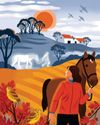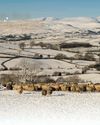Prøve GULL - Gratis
THE GREAT SOLAR DEBATE
BBC Countryfile Magazine
|March 2024
If developers have their way, miles of Oxfordshire farmland will soon be covered with solar panels. Many local people are opposed but how vital is this sustainable energy for our countryside? Andrew Griffiths investigates

When you come over that hill at Watlington, and you look over a whole swathe of lovely meadows and fields, you feel that you are coming home," says Laura Reineke. "It is a little piece of heaven." Reineke is referring to the rolling countryside to the west and north of Oxford, scattered with villages and farms and defined by the winding valleys of the rivers Glynne, Cherwell and Evenlode. But that picture of a rural idyll could change dramatically if plans for Europe's biggest solar farm are approved.
The proposed Botley West Solar Farm will cover farmland on the Blenheim Estate with ground-mounted solar panels - "a monoculture of glass and steel," according to one local resident. The scope of the proposal is massive.
The solar panels would cover 1,011 hectares of land - equivalent to about 1,200 football pitches. They would generate 840 MW enough electricity to power 330,000 homes.
The project is dividing opinion. Robert Courts, Conservative MP for Witney and West Oxfordshire, is against the proposal, referring to it disparagingly in the House of Commons as "Blenheim Power Station". In contrast, the CEO of Blenheim Estate Dominic Hare talks about "the positive role we could play in reversing climate change and helping to adapt to it" in the context of the "climate catastrophe" we're facing.
Reineke - communications manager for the Campaign to Protect Rural England (CPRE) Oxfordshire - has another interpretation. "The people set to gain from Botley West are the Blenheim Estate, the developers and local government," she says. "It is all about money."
WHY DO WE NEED SOLAR?
Denne historien er fra March 2024-utgaven av BBC Countryfile Magazine.
Abonner på Magzter GOLD for å få tilgang til tusenvis av kuraterte premiumhistorier og over 9000 magasiner og aviser.
Allerede abonnent? Logg på
FLERE HISTORIER FRA BBC Countryfile Magazine

BBC Countryfile Magazine
Manors and meadows
This December marks 250 years since Jane Austen's birth. To celebrate, Jack Watkins ambles around Chawton, where the writer penned novels that changed fiction forever
7 mins
December 2025

BBC Countryfile Magazine
TOP 10 ROYAL RESIDENCES
Castles, palaces and stately homes open a window into the history and private lives of the British monarchy
9 mins
December 2025

BBC Countryfile Magazine
Your countryside
HAVE YOUR SAY ON RURAL ISSUES
1 mins
December 2025

BBC Countryfile Magazine
Community spirit
Rural pubs across Britain are closing at an alarming rate - but local people are fighting back to save inns that have been at the hearts of their villages for centuries. Vivienne Crow orders a pint
4 mins
December 2025

BBC Countryfile Magazine
Gift ideas for nature lovers
Find inspirational and thoughtful presents for all the family in our pick of top outdoor gear and a round-up of this year's best nature and wildlife books
2 mins
December 2025

BBC Countryfile Magazine
Toad numbers are in freefall.It's in our power to save them
After becoming engaged at Christmas in 1998, my new fiancé and I were confronted by an enormous toad on the way to meet the vicar.
2 mins
December 2025

BBC Countryfile Magazine
Conquer fell running
Infamously tough yet famously friendly, the sport of fell running will take your fitness to new heights amid the wildest landscapes. Here's our beginners' guide
3 mins
December 2025

BBC Countryfile Magazine
A glorious haunting
They lived in the same village and shared the same dreams – just 60 years apart.
6 mins
December 2025

BBC Countryfile Magazine
The big questions answered
Across the UK, but particularly in the southeast of England, giant and featureless buildings are springing up.
13 mins
December 2025

BBC Countryfile Magazine
Away in a manger
While most of us down tools and pick up the mince pies, a farmer's work doesn't stop for the festive break.
5 mins
December 2025
Listen
Translate
Change font size
